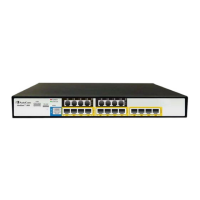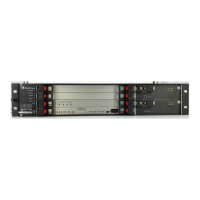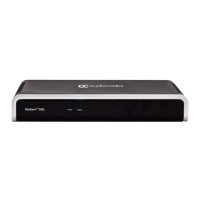SIP User's Manual 672 Document #: LTRT-12804
Mediant 800 MSBG
12.4.2 HTTPS Parameters
The Secure Hypertext Transport Protocol (HTTPS) parameters are described in the table
below.
Table 12-17: HTTPS Parameters
Parameter Description
Web: Secured Web Connection
(HTTPS)
EMS: HTTPS Only
[HTTPSOnly]
Determines the protocol used to access the Web interface.
[0] HTTP and HTTPS (default).
[1] HTTPs Only = Unencrypted HTTP packets are blocked.
Note: For this parameter to take effect, a device reset is
required.
EMS: HTTPS Port
[HTTPSPort]
Determines the local Secured HTTPS port of the device.
The valid range is 1 to 65535 (other restrictions may apply within
this range).
The default port is 443.
Note: For this parameter to take effect, a device reset is
required.
EMS: HTTPS Cipher String
[HTTPSCipherString]
Defines the Cipher string for HTTPS (in OpenSSL cipher list
format). For the valid range values, refer to URL
http://www.openssl.org/docs/apps/ciphers.html.
The default value is ‘EXP’ (Export encryption algorithms). For
example, use ‘ALL’ for all ciphers suites (e.g., for ARIA
encryption for TLS). The only ciphers available are RC4 and
DES, and the cipher bit strength is limited to 56 bits.
Notes:
If the “Strong Encryption” Software Upgrade Key is enabled,
the default of the HTTPSCipherString parameter is changed
to ‘RC4:EXP’, enabling RC-128bit encryption.
The value ‘ALL’ can be configured only if the “Strong
Encryption” Software Upgrade Key is enabled.
Web: HTTP Authentication Mode
EMS: Web Authentication Mode
[WebAuthMode]
Determines the authentication mode for the Web interface.
[0] Basic Mode = Basic authentication (clear text) is used
(default).
[1] Digest When Possible = Digest authentication (MD5) is
used.
[2] Basic if HTTPS, Digest if HTTP = Digest authentication
(MD5) is used for HTTP, and basic authentication is used for
HTTPS.
Note: When RADIUS login is enabled (i.e., the parameter
WebRADIUSLogin is set to 1), basic authentication is forced.
[HTTPSRequireClientCertificate]
Requires client certificates for HTTPS connection. The client
certificate must be preloaded to the device and its matching
private key must be installed on the managing PC. Time and
date must be correctly set on the device for the client certificate
to be verified.
[0] = Client certificates are not required (default).
[1] = Client certificates are required.

